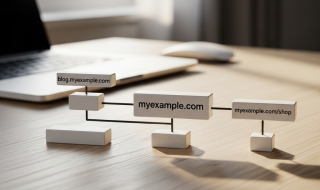 In an age where data is hailed as the new gold, the internet is the bustling marketplace where this precious commodity is exchanged. But amidst the bright lights of genuine websites, lurk their darker twins, known as "mirror" or cloned sites. These parallel worlds, while intriguing, raise many questions on ethics and the very fabric of the digital landscape.
In an age where data is hailed as the new gold, the internet is the bustling marketplace where this precious commodity is exchanged. But amidst the bright lights of genuine websites, lurk their darker twins, known as "mirror" or cloned sites. These parallel worlds, while intriguing, raise many questions on ethics and the very fabric of the digital landscape.
What Exactly is a Cloned Website?
Imagine visiting your favorite website. It looks and feels exactly the same, but something's just... off. That’s what encountering a cloned website feels like. A cloned website is essentially a replica of another site, copying its design, content, and sometimes functionality. The intention can vary from benign purposes like backup or reducing network traffic to more malicious ones like scamming users or bypassing restrictions.
Sarah, a tech-savvy digital marketer, shares her experience: "I once landed on a mirror site thinking it was the original. Everything looked the same, but when I tried to make a purchase, I sensed inconsistencies in the payment process. Luckily, I backed out in time."
Walking the Tightrope: Is it Legal?
In the USA, cloning a website without permission can be a murky affair. Intellectual property laws, such as copyright, protect original website content, design, and sometimes even layout. So, replicating a site without the owner's consent often treads into illegal territory.
Renowned cyber-law attorney, John D. Lorne, states, "Website cloning, especially for fraudulent purposes, can lead to legal repercussions. Original website owners can sue the cloners for damages, and in cases where personal data is stolen, cybercrime laws can come into play."
Can Any Website be Cloned?
Technically, any website's front-end (what you see) can be cloned. The back-end processes, databases, and other intricate functionalities, however, are harder to replicate without insider access. It's akin to copying the cover and pages of a book but not its soul or essence.
A recent survey highlighted that 23% of internet users in the U.S. have come across cloned versions of popular websites, indicating the scale and widespread nature of this phenomenon.
Hunting for the Ideal Clone: Is There a "Best" Website to Copy?
This is a loaded question. From a technical standpoint, simpler websites without complex functionalities are easier to clone. But from an ethical angle, the best answer is: None. Instead of searching for the best website to clone, budding web developers and entrepreneurs should focus on creating original, authentic platforms.
Dr. Eleanor Rigby, a professor of digital ethics, offers a compelling perspective: "Innovation in the digital realm thrives on originality, not duplication. While it's simpler to walk the path already paved, true progress lies in carving new routes."
Concluding Thoughts
Mirror or cloned sites, while fascinating, bring forth a plethora of ethical, legal, and technical questions. As the digital world continues to evolve, it becomes imperative for users to be vigilant, for creators to prioritize authenticity, and for regulations to adapt to these ever-emerging challenges. After all, in a world striving for genuine connections, shouldn't our digital platforms reflect the same ethos?




 Phone Consultation
Phone Consultation
 Request a quote
Request a quote
 Text a Message
Text a Message